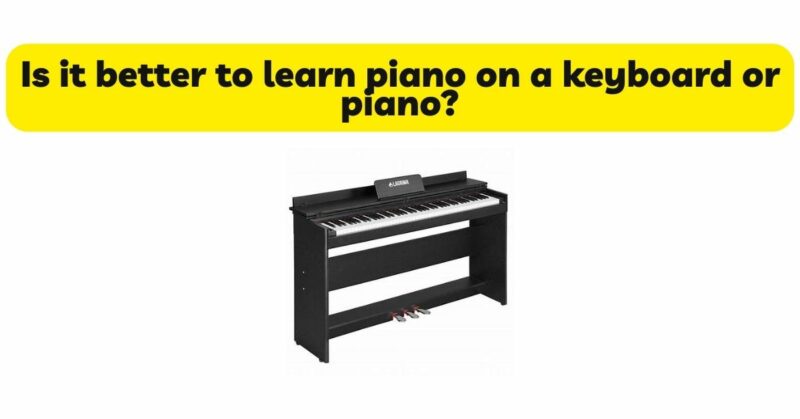Learning to play the piano is an exciting and fulfilling journey that requires dedication, practice, and the right instrument. When it comes to choosing between a keyboard and an acoustic piano, aspiring pianists often find themselves faced with a crucial decision. In this article, we will delve into the advantages and considerations of learning piano on a keyboard versus an acoustic piano, providing insights to help you make an informed choice based on your goals, preferences, and circumstances.
- Touch and Feel: One of the fundamental differences between a keyboard and an acoustic piano lies in the touch and feel of the instrument. Acoustic pianos have mechanical action, with hammers striking strings, offering a tactile experience that responds to the player’s touch. This touch sensitivity is crucial for developing proper technique and dynamic control. While some keyboards attempt to replicate the touch of an acoustic piano with weighted keys and graded hammer action, they may not fully capture the nuances of touch response. As a result, learning on an acoustic piano can help pianists develop a more refined touch and sensitivity that translates well to other acoustic pianos.
- Sound Quality and Expression: Another crucial aspect to consider is the sound quality and expression of the instrument. Acoustic pianos produce a rich and resonant sound that is highly regarded for its depth and complexity. The harmonics and overtones created by the interaction of strings and soundboard contribute to the unique character of an acoustic piano. Keyboards, on the other hand, produce electronically generated sounds that aim to replicate the piano’s sound. While modern keyboards have made significant advancements in sound sampling, the depth and authenticity of an acoustic piano’s sound are challenging to fully replicate. For pianists who value the acoustic piano’s unique tonal qualities, learning on an acoustic instrument is preferred.
- Cost Considerations: Financial considerations play a significant role in the decision-making process. Acoustic pianos tend to be more expensive compared to keyboards. Factors such as brand, size, condition, and age can greatly influence the price of an acoustic piano. On the other hand, keyboards are generally more affordable, with a wide range of options available to suit different budgets. Keyboards offer an accessible entry point for beginners and those with limited financial resources. However, it is worth noting that advanced digital pianos with weighted keys and advanced features can approach the price range of entry-level acoustic pianos.
- Portability and Space: Portability and space constraints are essential factors to consider, especially for individuals who frequently move or have limited living space. Keyboards are lightweight, compact, and easily transportable, making them suitable for individuals who require mobility or have space limitations. They can be set up anywhere, allowing for convenience and flexibility in practice. Acoustic pianos, on the other hand, are heavy, bulky, and require a dedicated space due to their size and weight. Moving an acoustic piano can be challenging and often requires professional assistance. Therefore, those with limited space or who anticipate relocation may find keyboards more practical and convenient.
- Learning Resources and Technology: Both keyboards and acoustic pianos offer access to a wealth of learning resources. However, the digital nature of keyboards opens up additional opportunities for learning through technology. Keyboards often have built-in metronomes, recording features, and connectivity to computers or mobile devices. This integration allows for interactive learning tools, music software, and online tutorials that enhance the learning experience. Moreover, keyboards offer a variety of sounds and accompaniment options, which can aid in exploring different musical styles and genres. Acoustic pianos, while lacking these technological features, have a vast repertoire of classical and contemporary sheet music available for pianists to explore.
- Long-Term Goals and Aspirations: Consider your long-term goals and aspirations as a pianist when deciding between a keyboard and an acoustic piano. If you aim to pursue a professional career in piano performance or become a concert pianist, the acoustic piano’s touch, feel, and sound quality may be essential for developing the necessary skills and techniques. However, if your goals lean towards composition, music production, or exploring a wide range of sounds and styles, a keyboard may provide the flexibility and versatility you seek.
Conclusion: The choice between learning piano on a keyboard or an acoustic piano ultimately depends on various factors, including touch sensitivity, sound quality, cost, portability, and long-term goals. Acoustic pianos offer the authentic touch, feel, and sound that are highly valued by pianists. However, keyboards provide accessibility, affordability, and technological advantages that can enhance the learning experience. It is essential to assess your personal preferences, resources, and circumstances to make an informed decision that aligns with your musical aspirations. Ultimately, regardless of the instrument you choose, a dedicated and consistent practice regimen is the key to success in mastering the piano and achieving your musical goals.


